“Ibn Khaldun: the scholar of the East and West” conference is held at the University, and recommends the establishment of an institute named after Ibn khaldun at the University.
Participants in the scientific conference of “ Ibn khaldun: the scholar of East and West” that was held by the Department of Sociology and Social Work in the Faculty of Arts at An-Najah National University recommended the establishment of an institute named after Ibn khaldun at the University, and naming one of the University buildings after the scholar Ibn khaldun. They also called for holding the conference annually. The conference was held in the Martyr Zafer Al-Masri Auditoriums in the old campus in commemoration of Ibn Khaldun’s sixth century.
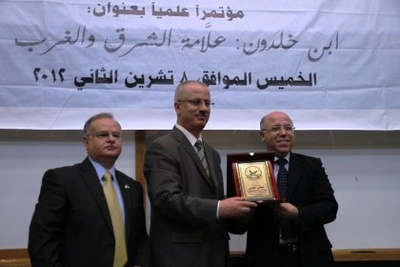
Before commencing the conference, the President of University Professor Rami Hamdallah welcomed his Excellency Mr. Lutfi Al-Maloly, the Tunisian ambassador to the Palestinian National Authority, at the University and confirmed the depth of the Palestinian Tunisian relationships. Mr. Al-Maloly thanked Prof. Hamdallah for inviting him to attend this significant conference.
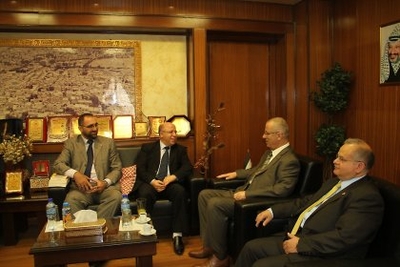
Amongest the attendees of the preliminary session were Mr. Al-Maloly, Prof. Hamdallah, Dr. Maher Abu Zant (The Head of Conference's Organizing Committee),members of the organizing committees, and a number of researchers from Palestinian universities. Research papers from universities in Tunisia, Jordan, Egypt, Algeria, Iraq, and Morocco were presented in the conference.
Professor Rami Hamdallah, President of An-Najah National University, gave a welcoming speech to the audience in initiating the conference which is considered one of the significant conferences as it exhibits the life, thought, and production of a scholar who was one of a kind in his learning and thought.
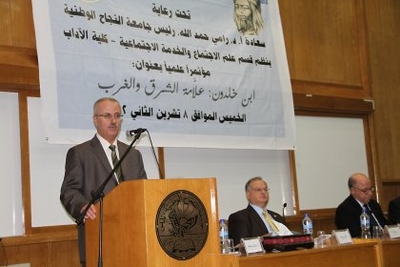
The President of university expressed the importance of commemorating Ibn Khaldun saying that “this great scholar whose learning and books are still the focus of research and readings even after six centuries since his death is among figures that are rarely remembered or mentioned, and An-Najah University in all its bodies attempts constantly to commemorate the scholars in fields of sciences and knowledge through all what is new and developed. And I consider our scholar for today, so did other researchers and historians, the founder and pioneer of sociology and many sciences.
It was probably his studies of Arabic, The Holy Qur’an, Hadith, the sciences and theories of logic and sensible sciences of other scholars before him, the fluctuation of political circumstances, conflicts and disputes that created a fertile environment for his ambitions, the matter that made him the focus of many politicians, and granted him many positions. Consequently, he was well informed of what ancient intellectuals and scholars of different nationalities wrote about human being. He subjected theories to his ability of critique, scrutinizing, and processing through his keen perception, and deep scientifically objective thinking. This is evidenced in his readings and writings of the history of mankind and in his keen observations of what was happening in his time of political, administrative, and judicial fluctuations, in addition to his travels to many countries with different political and social systems and different governments.
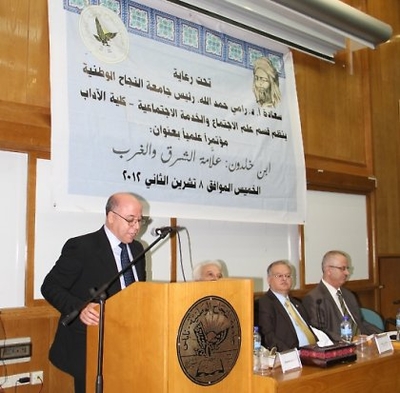
The President of University pointed out the need to highlight the status of this scholar to a greater extent, and to undertake more research and studies about his life and unique scientific production. He also pointed out the need to continue holding scientific activities and events that represent different points of Ibn Khaldun’s thinking and what can be possibly built on it. Moreover, Prof. Hamdallah asked the College of Literature and the Deanship of Scientific Research to peruse tackling such points of Ibn Khaldun’s thinking and to consider the possibility of naming one of the University’s facilities after Ibn Khaldun or designating scientific and researching prizes after the name of this pioneer who is considered a prominent figure among the founders of the Islamic and Arabic civilization and the world civilization indeed.
In return, Mr. Al-Maloly said: “ It is my pleasure to be here at An-Najah National University, the leading scientific edifice in Palestine, and the pioneering beacon at the Arab national level”. He thanked An-Najah National University for organizing this conference that shed the light on Ibn khaldun, The Arab Tunisian philosopher and intellect who set for the world significant basis of sociology.
Al-Maloly expressed Tunisia’s concern toward commemorating the scholar Ibn-Khaldun through erecting a great monument for Ibn Khaldoon in Tunisia, and establishing Al-khalduniah school in the nineteenth century, in addition to printing his image on Tunisian banknotes.
Al-Maloly concluded that the fame of Ibn-khaldun made several orientalists mention him, and admit his great role in serving theories of sociology.
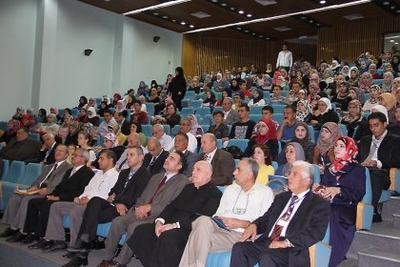
Dr. Abu Zant welcomed and thanked the audience for attending the conference; he also expressed his thanks to Mr. Al-Maloly for attending the conference works. On behalf of the organizing committee, Dr. Abu Zant welcomed the scholars taking place in the conference, whose generous contributions and attendance of the conference’s sessions made it possible for the conference to see the light.
Abu Zant added that this conference was to commemorate the scholar Ibn-Khaldun’s anniversary as today coincides to be the sixth century anniversary after he had left us a collection of precious books, most importantly his book Muqaddimah of Ibn Khaldun, or the Prolegomena, which was and is still considered a good basis for a number of sciences and knowledge. It is a truth that we build a great future for science and arts out of his ideas, and it is from his life developmental transitions that we take lessons and wisdom. Ibn-Khaldoon indeed shaped a past upon which we can build a lot. We shade under his shadow and through his light and flare we find ours.
The conference’s themes included Ibn-Khaldun, the pioneer sociologist, Ibn-Khaldun and Therapeutic and Applied sociology, Ibn Khaldun a historian and educator, Ibn Khaldun and his relationships with Arab rulers and scholars of his time, and Ibn-Khaldun the linguist, the Faqih, the scholar, and philosopher. .
The concern with Arab and Muslim scholars and scientists has been An-Najah’s focus over the years, and its administration has sought to bring those scholars and their lives to the light for the coming generations to recognize their contribution and achievements. The University managed to do so through holding many conferences and lectures that addressed the life of notable Arab and Muslim scholars and in which renowned notables and key figures participated from inside and outside the country.
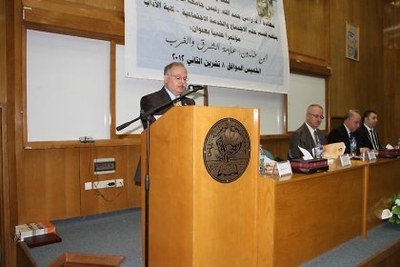
The conference aimed at Addressing the life of Ibn Khaldun, recognizing his efforts to establish the foundations of the philosophy of history, education and sociology, and highlighting his efforts in describing the developmental transition of nations from bedouinism to civilization, and the progress of people across the different fields of life such as sociology, religion, policy, economy, science and art, in addition to the rise and fall of countries and the characteristics of Bedouins and urban people. The conference also aimed at highlighting Ibn Khaldun’s efforts in documenting the life of Barbarians, as he is recognized as the best to document life in Morocco in the Middle Ages, and shedding light on the importance of the applied aspect of sociology and its uses in daily life, whether in the life of individuals or within institutions. Moreover it aimed at explaining the impact of Ibn Khaldun on modern social thinking as his opinions have become a major cornerstone in modern human intellect, highlighting the role of Ibn Khaldun as a thinker and pioneer in the field of sociology as well as other fields such as education and Fiqh, and commemorating Ibn Khaldun’s sixth centenary in addition to documenting the relationship between the University and academics working in the field of scientific research.
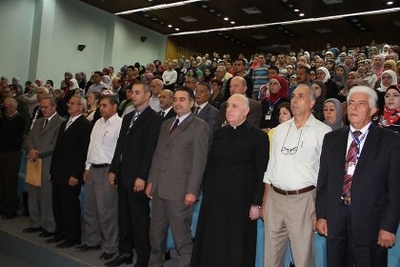
In concluding the conference’s preliminary session, professor Rami Hamdallah presented a plaque of appreciation to the Tunisian ambassador for his efforts and distinguished role in supporting science, culture, and education. Dr. Abu Zant also presented a plaque of appreciation to professor Rami Hamdallah for his efforts in supporting the conference.



